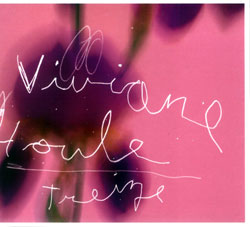
On Treize, Canadian vocalist Viviane Houle showcases her formidable vocal talents and her flair for duets. On thirteen different pieces, she squares off for duos with thirteen instrumentalists. Houle's versatility and power quickly become clear, as the album runs a gamut from noisy sparring with extended techniques to demonic Galasian lounge singing to ambient space music.
The disc starts of with a bang — if not in terms of decibels, certainly in terms of astounding improvisation — on "Mandrake," arguably the best piece on the album. Cellist Peggy Lee and Houle strike a perfect balance of idiosyncrasy and interaction, each leading with her own ideas just enough to forge new directions, and following along just enough to surprise themselves and the listener. The piece also introduces us to Houle's inhuman range. Her transition at the end of the piece from trombone-like gurgling to a shriek as high as a violin's harmonics takes the listener's breath away as much as it surely took Houle's.
There are several other standout pieces on Treize. Matching vocals against an extended percussion kit may seem daunting, but Houle is more than a match for the task on "Gratte-moi le dos." Evoking bird calls, hinges, witches, and other extreme vocalists like Shelley Hirsch and Dennis Palmer, Houle shows that her palette is easily as broad as percussionist Kenton Loewen's bag of tricks is deep. The track "Finely tuned is my heart" keeps one guessing throughout, with trombonist Jeremy Berkman proving that, in the right hands, the trombone can work just as well as a piano or guitar in an accompanist's role.
Houle seems to have chosen co-conspirators who, like herself, are good at creating particular atmospheres, or overall "feels" for pieces. She and saxophonist Coat Cooke, for example, stay fully with austere ambiance for the entirety of "Paperthin," and she revisits this bleak northern landscape with Chris Gestrin on "It's not the moon." On "Quiet Eyes," Houle's sung text melds with Ron Samworth's guitar loops, creating an eerie cinematic aura. The best of these textural pieces, though, is probably "A little storm." It is occasionally difficult to tell who is doing what, as Houle and guitarist Jeff Younger zigzag around the stereo space, across time (apparently using looping technologies) and along various sonic registers.
As a whole the CD is nothing if not impressive. Houle not only owns the many avant vocal styles on display here, she has something unique — sometimes stunningly brilliant — to bring to each of them. But the overall apparent strategy of the album is perhaps something of a risk. While Houle shows that she can handle a large number of different outsider styles, the resultant melange of approaches threatens to come off more like a portfolio than an aesthetically unified set of pieces. Houle clearly shows her playful inventiveness on this album, her ability to surprise and forge new directions from the familiar. But occasionally the results don't add up to quite as much (e.g. the pseudo-metal/punk workout that guitarist Brett Belke engenders on "Song not for you") and they seem too referential, interrupting from the things Houle does best. This is a minor worry as the high points on this CD are more than enough to prove that Houle should stay on one's radar.
Comments and Feedback:
|



